Kevin Bacon Is Afraid of Just One Thing

Just last year, during the final episode of his podcast, Kevin Bacon gave listeners the chance to ask him (almost) anything. The name of the episode even said so: “Ask Kevin (Almost) Anything.” The very first question was not about love or loss, or acting, or if he and Chris Rock would consider remixing their Vanilla Ice skit from when Bacon hosted Saturday Night Live. It wasn’t about whether he ever feels compelled to say, “Houston, we have a problem,” when something’s amiss at home. No, the first question, that is always the question, was about his feelings on the whole six-degrees riff—the thing where he’s positioned like origin matter in the Big Bang theory and every other actor in Hollywood can be connected back to him through movies they’ve done, in six roles or less.
Bacon began with a dutiful explanation on how surreal the whole game was when it started; how weird, at first, it was to be on the receiving end of viral fame before social media existed; how uncertain he felt as a youngish actor in 1994 to be in the middle of something where he wasn’t quite sure if he was in on the joke or if he was the joke himself. But then, with the gentle reorientation of a zen teacher, he pivoted to say that what’s really beautiful, actually, is not the act of college students getting drunk and connecting dots on how the likes of Lawrence Olivier and Timothée Chalamet are chain-linked to his filmography. It's how, in the end, the deeper and more poignant realization is that we’re all just connected to each other. If you think about it, in the greater cosmic sense, isn’t that what matters most?
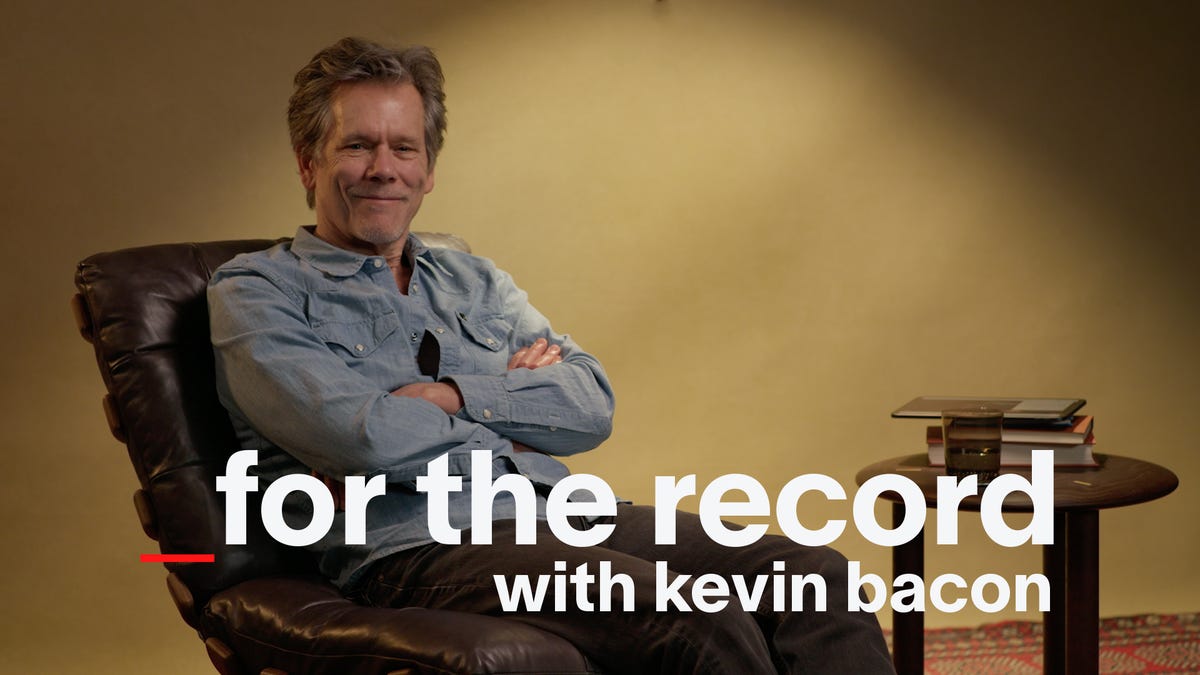
And so, here we are, Kevin Bacon and I, seated at a restaurant table in Midtown Manhattan to talk about his latest role on a new Prime Video series called The Bondsman. On paper, the show (a campy, gory, Blumhouse production) is about the undead. In our conversation, it’s a means to learn about something that haunts Bacon in real life: Irrelevance. If you listen closely to the way Bacon tells his story, in measured, resonant tones, he’s a regular guy who can’t quite believe his run. Someone who works a lot, but whose ratio of success versus non-success skews to the latter. A lucky schmuck still chasing after the only big hit he’s ever had. What feels like the real joke here, to everyone with even a twinkling awareness of his identity, is that he’s serious.
Bacon is sixty-six now, with the same slim build and cut jaw he rocketed to fame with in 1984. We meet on an early spring day in New York, the weather barely wrested free from the dregs of winter. He’s wearing dark sunglasses and a puffer vest over a button-down, the top of which has been left undone to his mid-chest. If you didn’t already recognize him, Bacon's hair, a salt and pepper field, is a dead giveaway. He tugs at it throughout our conversation.
We’re at the Living Room (which, to be clear, is a restaurant) on the second floor of the Park Hyatt Hotel, and Bacon’s eyes are fixed on the ceiling. The hanging artwork and glass look familiar. Bacon glances around, musing on whether the design of the space is new. “It’s reminiscent of Philip Johnson or something.” He asks me if I know whether the design of the space is new. I do not. He pauses, clocking the room. “It's just so funny that it's so retro, very ‘50s, it's interesting.” Bacon’s father was an architect. The actor was actively not interested in his dad’s career as he was growing up, but all the stuff he was always banging on about—art, furniture, drawing, design—got under his skin anyway. “I think this might be new,” he decides, after all.
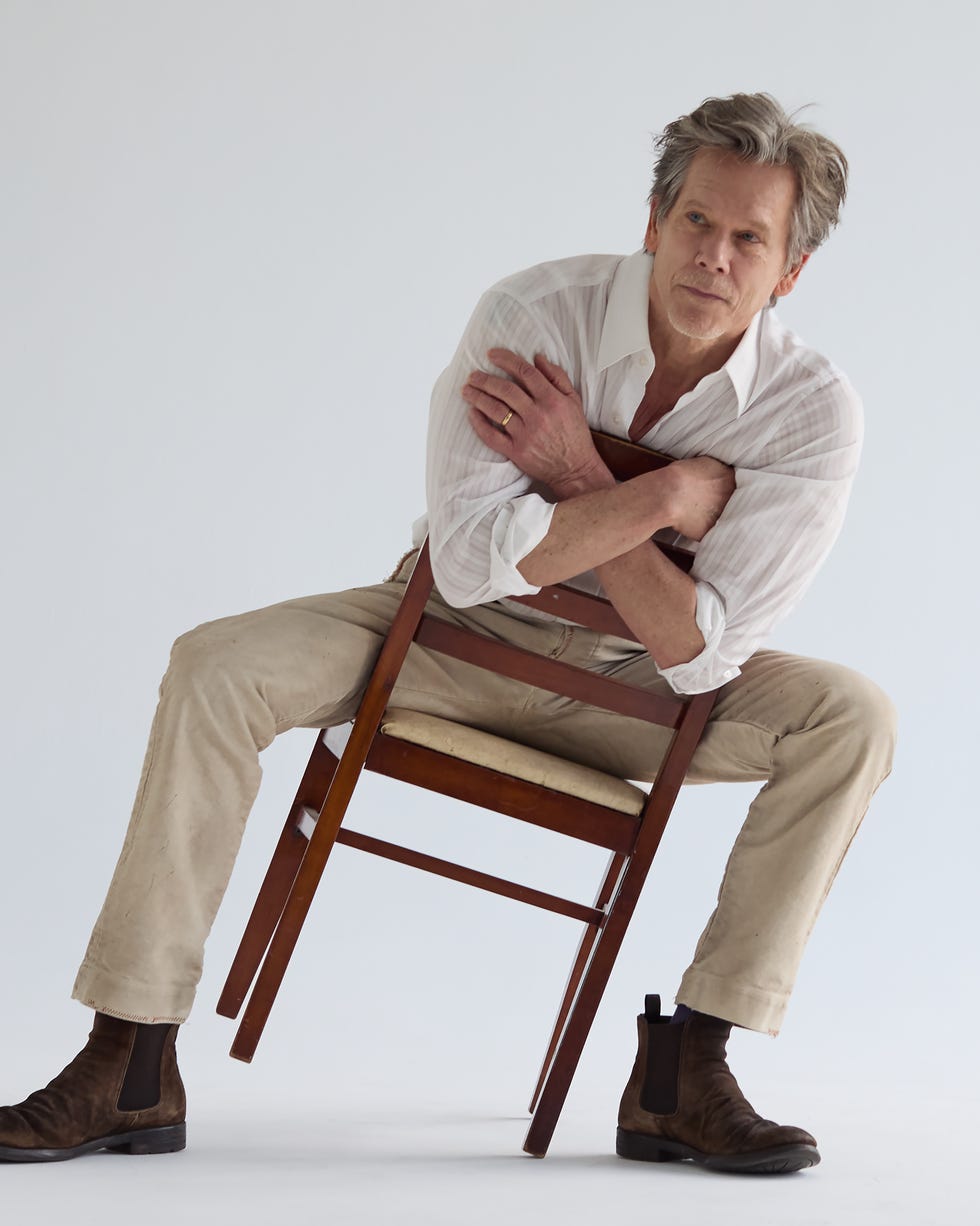
Shirt by Carter Young. Jeans by Fabric Brand. Boots, Bacon’s own.
In Bondsman, Bacon plays Hub Halloran, a down-on-his-luck, curmudgeonly bounty hunter who skulks around in fitted T-shirts and bemoans his current circumstances. The show is a horror comedy, opens with Norman Greenbaum’s fuzz-toned “Spirit in the Sky,” and a scene of Hub getting his neck sliced open. His death is not a spoiler; the premise of the series hinges on the devil recruiting Bacon’s character post-mortem to hunt his demons. Hub squandered his time on earth—lousy husband, absent father—and is now stuck in an undead iteration of his mortal coil. Also, he wants to be a country music star. And maybe patch things up with his ex-wife. He’s got a lot to work on.
While the role gave Bacon the chance to try something new as an actor—writing music entirely from a character’s point of view—the show itself is not a comeback vehicle. There is no need for a Baconaissance, because, contrary to his own belief, Kevin Bacon has never been irrelevant. In his nearly fifty years as a working actor, there have been periods of feast and famine, tired slumps, and hot streaks. Flops, failures, endless breakfast puns, and a Golden Globe and Razzie win apiece. He’s played detective, victim, med student, criminal, scientist, and cad. He’s starred in films about presidents, rapists, rafters, astronauts, and ghosts. Some of his movies have been nominated for Academy Awards. Some are famous for the scenes and dialogue he didn’t deliver, but are movies in which he appears nonetheless. A villainous flat-topped Marine Captain in A Few Good Men, a crusading detective in Wild Things, the jerk who steals Neal’s (Steve Martin’s) taxi in Planes, Trains and Automobiles. Money has come—and for a period of time beginning in 2008, as part of the $65-billion-dollar Bernie Madoff tide—it has gone.
For all the spikes and daggers that is a long career in the public eye, Bacon has done the unusual thing of remaining very appealing. No one, it seems, is a Kevin Bacon hater. When I mention our interview to a friend, his question is easy enough: “Ask him how he stays so fucking cool after all these years.” The meteor that was Bacon’s dancing breakout in Footloose blasted American pop culture so hard that an ensuing career grew around, and perhaps never fully away from, the crater it left.
Few actors know how it feels to have a role become a cultural phenomenon. To have a film, or a song, dissolve like a biologic mesh, irremovable from the identity of the person associated with it. Kevin Bacon has done so much for so long since Footloose. And yet, Footloose, probably, will always be the thing people think of first.
When Bacon describes it, he sounds pensive. A little wistful, even. “Honestly, I'm still looking for the one,” he says. “I've got this great career, but for a long time, the biggest success—probably to this day, actually—that I have is Footloose. I have never really had another one of those. And I would like that.”
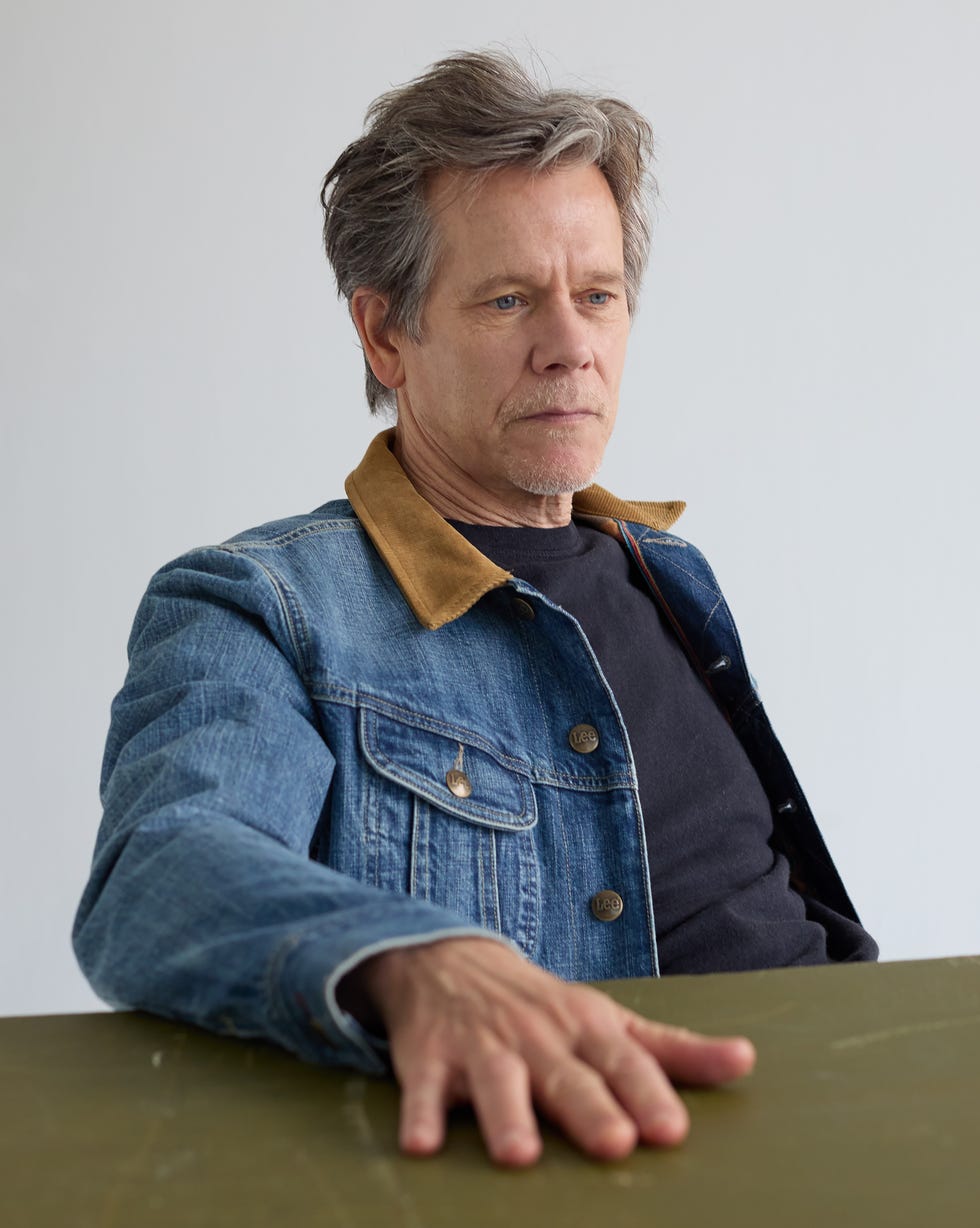
Jacket by Lee x Paul Smith. Shirt by Jungmaven.
Bacon and his wife, the actress Kyra Sedgwick, split time between Manhattan’s Upper West Side and also occasionally at their farm in Connecticut. (Their two children, Sosie and Travis, live in Los Angeles.) The couple revels in all the things Bacon’s father loved. “Kyra and I, our houses are self-furnished, so we’ve been pretty hands-on with the way that we wanted things to go. We’re the type of people that architects and designers go, ‘Oh, shit, they have opinions. Oh, God.’"
He is in the middle of explaining something else when I interrupt to ask about the farm again. He has a lot of animals on that Connecticut farm, right? He does indeed. Big horses, little horses, pigs, goats, chickens. At one point, there were even alpacas. “Oh good,” I say, because there is a giant dog, indoors, walking right up behind him. Bacon cranes his head around and lets out a series of high-pitched yips in the poodle mix’s direction. His impression is uncanny. And slightly unhinged.
“I'm so mean,” he says, laughing. “I always do that around dogs. The secret is to suck in.” Anyway, he continues: “My mother had a horse when she was a child, and she would talk about it, so I think that ingrained itself in me. That, and being a New Yorker, because she was a New Yorker. I bought the farm in 1983.”
The timing of Bacon’s farm purchase pre-dated Footloose fame, but the idea was simple. He was going to go to Connecticut, where he’d never been before, and buy a house, which he’d also never done. (“A rundown little farmhouse with a tiny little wood stove. That’s where it started.”) He ended the relationship he was in to go live on his new farm and become Solitary Man With Dog In a Cold Winter. “It was a very romantic, very Robert Frost notion,” he says. “Big wool jacket and long walks. Dead of winter, chopping wood all day long. And really, that’s how I was living except for when I would go off and work.”
And then he met Kyra.
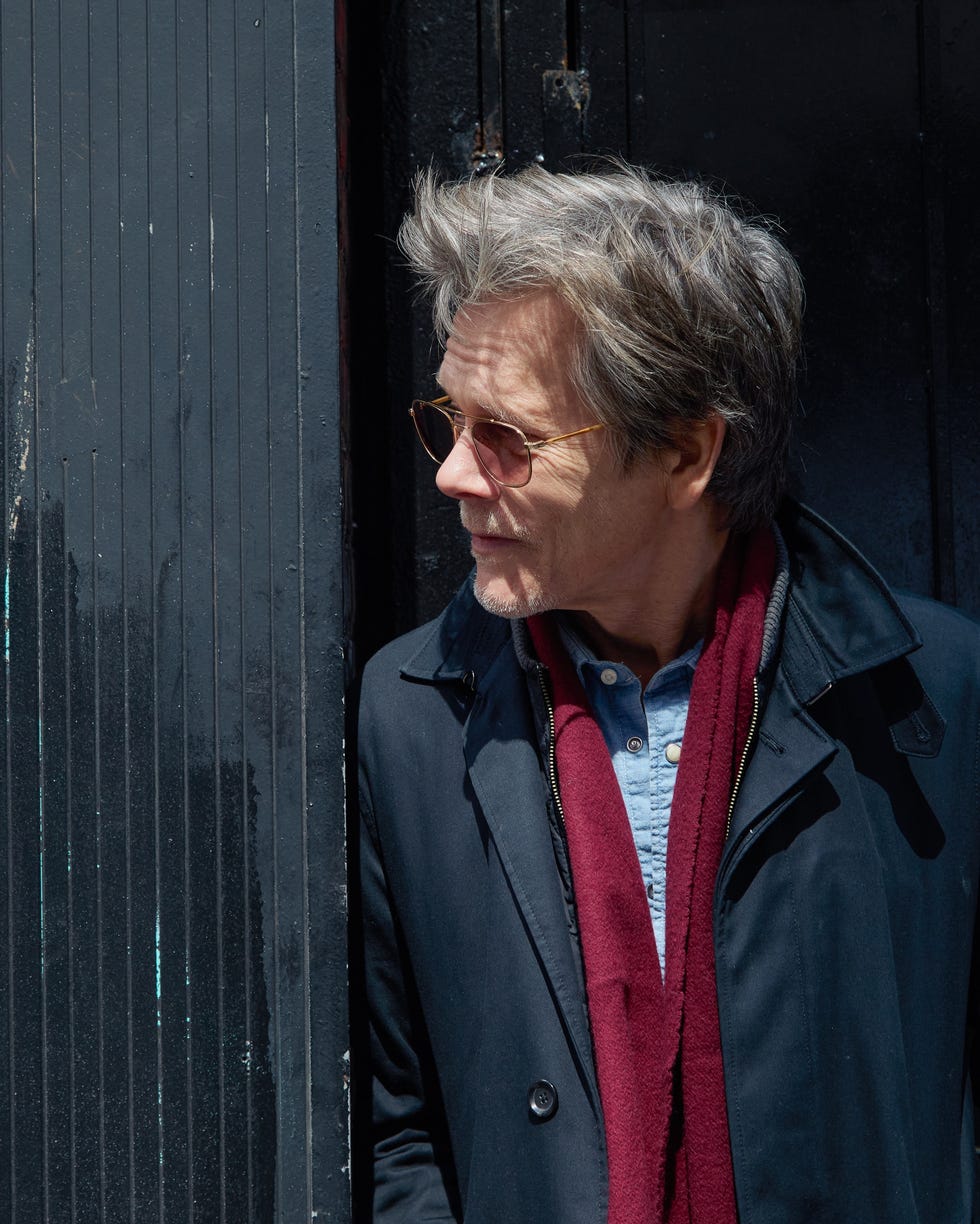
Jacket, shirt, scarf and glasses, Bacon’s own.
“She was willing to fold into all that for a while,” he says. “We were living in Connecticut to raise our kids.” The pastoral harmony lasted until their son was about six. “Kyra went, ‘Guess what? I'm done.’ It was reverse Green Acres. She was like, ‘I want to go have lunch with my friends. I want to be able to go to Bergdorf’s.’ I’m making her sound very shallow, but she's not that way at all. Really, she just felt very isolated.” They had the biggest fight of their lives about it, but in the end he relented, and they gave it a try. Sedgwick was right. “Once again, one hundred percent right. It was the best thing for our children. It was the best thing for our marriage. It was the best thing, even from a real-estate investment standpoint.”
Over the years, the public—in this particular instance, that public amounts to the comments sections of Instagram and TikTok and readers of People and Deuxmoi and other celebrity fare—has glommed onto the idea of Bacon and Sedgwick as the ultimate couple. Still hot. Still loving. Still immune from the breakup virus that plagues most of Hollywood.
Bacon thinks it’s stupid.
“First off, it's our fault, okay?” he says. “And that's because of social media. When social media rolled around, it was my worst nightmare. It was exactly what I didn't want to do. I went to it reluctantly because of [my nonprofit] SixDegrees.org, and then eventually I got my own account and was just flirting around with it.” Bacon continued to resist, but heard someone on a podcast say don’t do it if you don’t want to do it. But if you are going to do it, do it right.
And now? “Listen, we’re not huge. But we do it pretty well.” They do. 4.2 million followers on TikTok, 4.6 million on Instagram. The posts about their family make everyone swoon. “Kyra was reluctant about it in the beginning, too. She's like, ‘Oh, you're kidding me. I've got to be in this? But also wait a second because my hair looks…[waves hand around].’ But she gets it now because unfortunately in our weird business, there's an element to it that is important to continue being employed.” He pauses. “I'm not an Oscar winner. I'm not an Oscar nominee. I need something to keep being considered. I've had way more unsuccessful projects than I’ve had successful ones.”
“You think so?” I ask.
Bacon insists. “All you have to do is look at IMDb. You'll see three things there that made money, and yet I still get a chance to work. Partly because I take a lot of work, but also, recently, because I've been able to do this shit online.”
He’s given some version of this proclamation many times before, but Bacon’s main take on marriage is that it doesn’t work. “Nobody stays married! How many marriages last? Who cares?” He and Sedgwick are, nonetheless, thirty-six years deep into theirs.
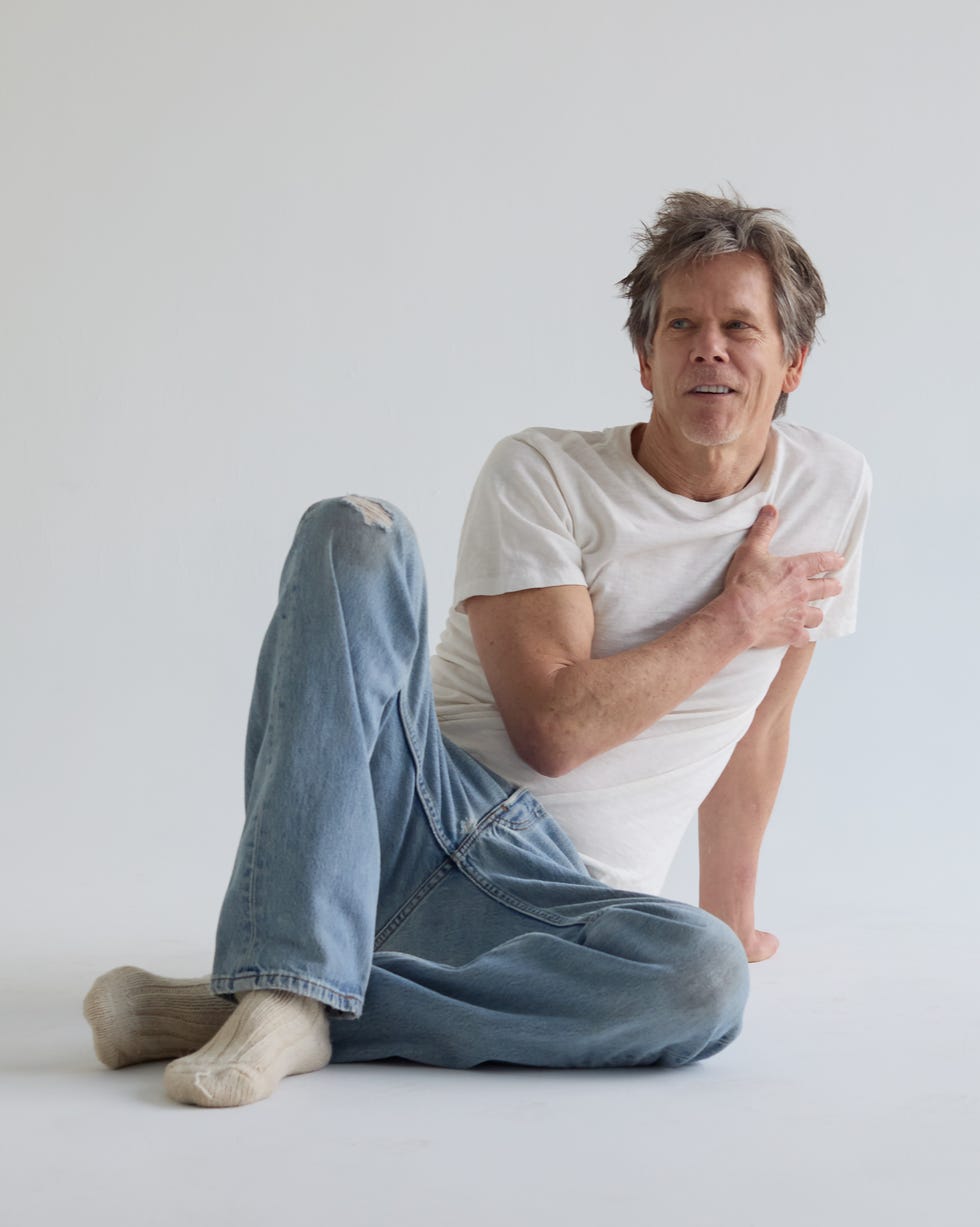
Shirt by Velva Sheen. Vintage jeans by Levi’s. Socks by American Trench.
With that settled, the conversation veers back into his show. Ahead of pitching, its creator, Grainger David, sent Bacon a playlist with the Johnny Cash song "Ain't No Grave" on it. The idea (that Bacon might have come up with; he can’t remember) was to play a snippet of that song for executives during pitch sessions and get them on board with the flavor of what the show would be—namely, Bacon with a guitar in hand, inhabiting the role of a melancholy country musician. So off they went from pitch to pitch, with Bacon strumming like a troubadour to sell the series. It worked.
Country music is somewhat inorganic to Bacon’s environment of origin. He grew up in Philadelphia, which is many things, but a country music den is not one of them. Bacon absorbed an early taste for soul and folk music through his brother Michael, who was nine years older and already in pursuit of a music career. It was Michael who got little Bacon his first guitar, and it is Michael who currently forms the other half of the eponymously named Bacon Brothers band. They play a genre of music they’ve dubbed “Forosoco”: Folk, rock, soul, country.
Also, when Bacon was twelve, he was in a soul band called Footloose.
“Really?”
Yes.
"I was a percussionist," he says, and briefly percusses the table.
In the end, we don’t speak about the riff on the six degrees of separation theory. It doesn’t come up, and after thirty-one years, asking about it feels like pointing out the snow during a blizzard. It’s just there.
Is Hal’s death in Bondsman meant to be a callback to your neck impalement scene in Friday the 13th?
No, it was not. In fact, it was a re-imagining of the pilot. We shot the original pilot and it was solid, but we discovered that people wanted to see how Hub actually died. Whenever you talk to actors about reshoots, it’s, Couldn't we have gotten it right the first time? I always go into them kicking and screaming, but almost always the end result gets better. We reshot the ending of Tremors. We reshot the ending of Footloose. We re-shot the ending of the recent Beverly Hills Cop that I was in. In Tremors, the audience said, "He's got to kiss the girl." I didn't kiss her originally. I liked the idea that it was a little sadder originally, a little more realistic. But if you have underground worms, why do you need realism?
There’s a very Nashville-infused twinge to the music in Bondsman. Have you spent a lot of time there?
We roll by maybe once a year to play a show, but I’ve never filmed anything there. Michael moved to Nashville when he was young. He got a publishing deal with Monument Records, and was a solo artist and a writer and lived very much the Nashville writing thing where he'd go in and sit down every day in the office with other writers and try to write hit songs. I visited him when I was a little kid. It was my first time ever going to the South.
When I went out to film Tremors [in 1989], I couldn't get anything else but country music on the radio. I had a Walkman, so I got into listening to it then. When The Bondsman rolled around, the music part of it was already baked into the pilot. Hub was written as an ex-musician.
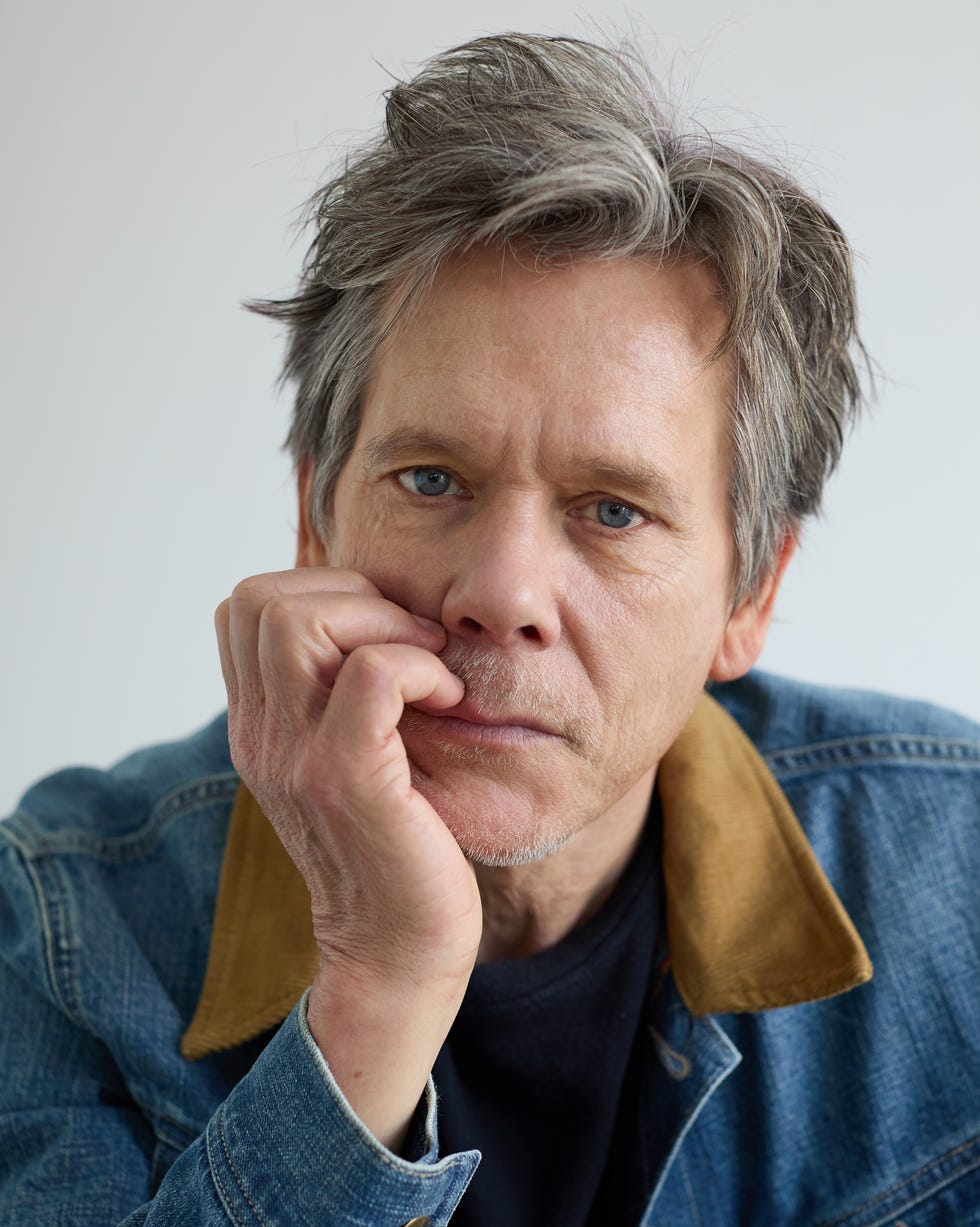
Jacket by Lee x Paul Smith. Shirt by Jungmaven.
The show is also kind of disgusting. Is there something about horror comedy that resonates with you?
It's funny that you say that, because people ask me why I keep returning to horror. Even when I look at Tremors, a great example of horror comedy, the studio really had no idea how to handle it. And what everyone forgets about that movie, even though it has a soft spot in people's hearts, especially in the heartland of America, is that it was a bomb. The life it took on was entirely reliant on the explosion of VHS and Blockbuster.
They went on to make movie after movie after movie with Tremors, none of which I was in. I was like,"I don't want to make a sequel of a movie that wasn't a hit. Why would I do that?" And they said, "Well, because we're going to sell the VHS." But I didn’t want to be the star of the video store.
Have you and M. Night Shyamalan ever worked together?
No. Which is weird, since I'm from Philly, and everything he does is in Philly. But he's never come knocking.
Are there movies you’ve done that you didn't love in the beginning and now have a different relationship to?
The truth is, that's a hard question to answer because I don't go back and rewatch my movies. But I'll give you an example of one that I did see recently, Stir of Echoes, because it just had its twenty-fifth anniversary and there was a special screening of it. That movie is so good. [The writer-director] David Koepp is still a close friend of mine. It's not that I didn't appreciate it at the time. It's that—speaking of M. Night—what happened with Stir of Echoes was just a giant fuck-up from the studio. They heard about The Sixth Sense while we were shooting. Someone got a hold of a script at some point. If Stir of Echoes had come out first, there's no doubt that The Sixth Sense would've still been a massive hit. But it’s the little boy who sees things, and is talking to dead people. In Stir of Echoes, it’s the little boy who sees things, and is talking to dead people. It was just in the zeitgeist. But when we brought this up, the studio was like, "Don't worry, kids. You don't know how to market a movie. We do."
Is it okay to ask about Bernie Madoff?
Sure. There's not that much to say, really. If it seems too good to be true, then it’s too good to be true.
From the outside, at least, it seems like you and Kyra aren’t too jaded from the experience.
No, not jaded. More careful. But not jaded.
I go to this gym. It has a few machines and only a handful of people there at any given time. There’s no showers, it’s very bare bones. But there’s a leg press machine. A leg press can be brutal. You’re on your back and you’re going like this. [Shifts and leans back to briefly hoist his legs up in the air.] The machine is right next to a window, and when I look out that window, I’m looking right at the building where Madoff was. I’m in excruciating pain, doing the leg press, staring out that window. It’s perfect, in a funny way, because I also have to think, I can get through this. And that’s how we felt about Madoff. It sucked, and we were certainly angry and all the things. But then we woke up the next day and said, “What do we got? We love each other. We love our children. We’re healthy. No one took away our ability to make a living.” So we got back to work.
Is there anything about your career that still surprises you? Something that, when you walk out onto set and think, in a good way, Holy shit?
What surprises me is that there's still so much I can learn. What surprises me is a moment in a performance where I think, Wow, I was truly free. Or when I've gone to another place with a character that is not a character I've explored before. It's partly just getting older and having life experiences that are lined up, or not lined up, with characters I’m playing.
It surprises me that I still love it as much as I do. I mean, I really do. I just fucking love acting. I love to create, and what that does is become an antidote to what I read in the fucking paper every day, and the things that I hear on the news. I'm pretty good about taking my morning routine and making that deliberate, and then going on and spending at least a large part of the rest of my day thinking about what to make.
I hesitate sometimes to use the word "artist," because there is something too highbrow about it. It never bothers them in the music business—they say "artist" all the time. But I do think creating is different, you know what I mean? It's like, is it art? Who knows? That's why I like the name Tyler, the Creator.
Opening image credits: Jacket by Lee x Paul Smith. Shirt by Jungmaven.
Photographed by Florence Sullivan
Styled by: Alfonso Fernandez Navas
Contributing Visual Director: James Morris
Contributing Design Director: Martin Hoops
Director, East Coast Video: Amanda Kabbabe
Senior Entertainment Director: Andrea Cuttler
esquire





